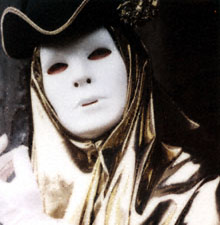

notes

Theory of Spectatorship

HamletWeb 2002

DJ XXI


Classes: Aesthetics

ShowCases: 3 Sisters, Mikado, 12th Night, Hamlet, The Importance of Being Earnest, Dangerous Liaisons, Don Juan
prof. Anatoly Antohin Theatre UAF AK 99775 USA (907)474-7751

my eGroups
Summary
Forms of gazeDirection of gaze
Angle of view
Apparent proximity
The eye of the camera
The social codes of looking
Questions

Notes
Spectator becomes active, he creates the spectacle....How do we define new audience?
What is "virtual" public?
Could we even use this term, when vTheatre is crossing into the field of Game and Ritual?

theology of the internet *
"The Talmud and the Internet:
(This section includes a brief summary of Jonathan Rosen’s book and Jon D. Leverson’s review.)
Rosen finds the Internet to be similar to the Jewish Talmud both in its mode as the connecting media of a community and in its often-baffling juxtapositions. The Talmud is the conversation of Rabbi’s about the Torah over hundreds of years; the internet allows us to participate in the modern version of the same conversation. Rosen writes of his difficult reconciling ancient order and contemporary chaos, and he finds a method for this in the Talmud. Leverson answers with reasons why such an analogy is not valid. The Talmud and the Internet, he says, both offer tremendous amounts of information in a seemingly chaotic manner, however, the Talmud has a unifying goal: wisdom and the creation of Jewish community. The Internet lacks this unifying goal as well as a moral center. Because of its nature, the internet runs counter to any attempt to control human passions with laws in the interest of community.
The Internet as a Metaphor for God:
(This section elaborates on Henderson, "The Internet as a Metaphor for God?") If the internet is a metaphor for God, then it is because it “resonates with our profound belief that life is not predictable.” The way some people use computers, as helpers and teachers and agents of growth, is in a way similar to a new conception of God. This is God as the passionate partner. This is a sharp departure from old patriarchal conceptions of God on a throne, and for many it is an appealing change. The internet is like God because it makes us aware of other people, and of our interdependence. When this stops happening, the internet is no longer like God. If community (communion) is the goal of God’s work, maybe the Internet is an appropriate metaphor for the Divine. Perhaps this answers Leverson’s challenge that the internet has no moral center: its moral center is simply communication, any and all. However, this metaphor only lasts as long as the internet really helps us get to know other people. The problem is this: we often forget that the internet is entirely the work of other human beings, fellow members of the human family. When we develop a “just me and the data” attitude, (in the terms of Martin Buber) we substitute and “I- it” relationship for what should really be an “I- thou” relationship. One of the main goals of religion should be to promote such “I-thou” relationships rather than dehumanized “I- it” encounters. (Thislethwaite, “Virtual Reality Christianity.” Groothius, “Christian Scholarship and the Philosophical Analysis of Cyberspace Technologies.”)
Textuality
Cyberspace is rooted in textuality. When cyberspace becomes more and more the dominant community, words become more important. Words and programming code make up the very landscape of cyberspace. When cyberspace becomes reality, words take on the magical status of a force for creation or destruction. (Ranjii. “Building Community Word by Word: Religion in the Virtual World”) As the word is “spoken,” it becomes “reality” on the web. Consider this: “In the beginning was the Word.” God creates by speaking. Christ is the word made flesh. This again attests to the power of human beings on the internet, for good or evil. In an age where humans can use mere words to create, the guiding power and responsibility embodied by religion becomes even more important.
The Presence of God
Mark Edwards in “A Theological Challenge: Virtual Worship" writes about the difference between worship in a physical church and in an online community. He wonders about whether the difference matters to anyone, and whether it matters to God. I am particularly interested in what he says about the sacraments. His point is that if one believes communion (as in most protestant denominations) to be simply a memorial to the work of God and the love of Jesus, it seems believers could celebrate or remember it online. However, if communion is the literal Body of Christ (as in Catholicism), how can it be distributed electronically? “Is virtual water sufficient for baptisms?
Galliot addresses this question in an interesting way. He says, “There are many kinds of Presence, and a slow ascension from the degrees of Presence is part of the mystery of religion. Right now, the community of believers needs a physical Presence for the sacraments. But who knows what the future will bring?” Christ’s presence is transcendent and not virtual. Ministry on the internet, in my mind, affirms God’s actions as not confined to a particular time and space. This idea is also relevant to the internet-as-gnosis idea discussed in the "problems of the internet" page."
Religion IN/AND Cyberspace conference
...


 Classes * Web * Shows * Bookmark vTheatre! Mailing List & News -- subscribe yourself *
Classes * Web * Shows * Bookmark vTheatre! Mailing List & News -- subscribe yourself *





